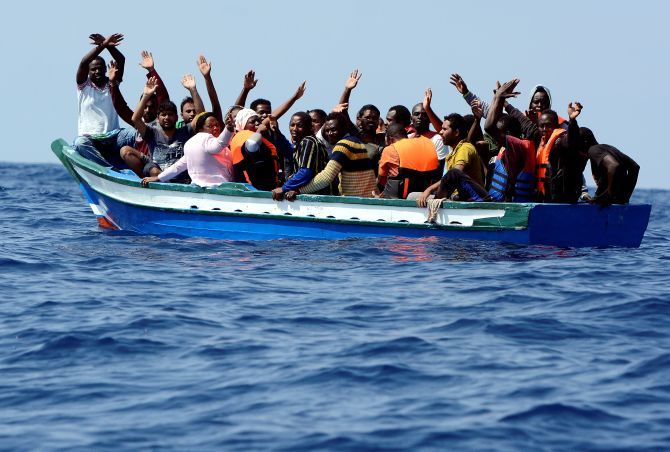Six people died every day last year trying to cross the Mediterranean Sea to Europe – “the world’s deadliest sea crossing”, the United Nations refugee agency said, citing ongoing political deadlock over sea rescue and disembarkation.

According to a new report from the Office of United Nations High Commissioner for Refugees, an estimated 2,275 individuals drowned or went missing in the Mediterranean in 2018.
This is despite the fact that Europe saw the lowest number of refugees and migrants arriving for five years, at 139,300, principally Spain (65,400), Greece (50,500) and Italy (23,400).
“Saving lives at sea is not a choice, nor a matter of politics, but an age-old obligation,” UN High Commissioner for Refugees Filippo Grandi said.
“We can put an end to these tragedies by having the courage and vision to look beyond the next boat, and adopt a long-term approach based on regional cooperation, that places human life and dignity at its core.”
Last year, shifts in policy by some southern European States have led to numerous incidents where people have been left stranded at sea for days on end because the boats carrying them have been denied permission to dock.
“Large numbers of often traumatised and sick people were kept at sea for days before permission to disembark was granted,” the report states.
Volunteer rescue boats and their crews have also faced growing restrictions on their operations, the UN report continues, adding that on routes from Libya to Europe, “one person died at sea for every 14 who arrived in Europe”.
This is a sharp rise on 2017 levels, when the rate was one death for every 38 arrivals.
At the same, UNHCR highlights that the Libyan Coast Guard’s decision to step up operations in 2018 meant that more than eight in 10 of those picked up at sea were disembarked in Libya, where they faced “appalling conditions” in detention centres.
This includes limited access to food, disease and “several” deaths, the UN report notes, confirming abuses that have long been documented by the UN human rights office.
The highest number of people arriving in Spain was from Morocco and Guinea (13,000 each), while most of those reaching Italy came from Tunisia (5,200) and Eritrea (3,300).
More Afghans than other nationals headed to Greece (9,000), followed closely by Syrian refugees (7,900).
“Setting foot in Europe was the final stop of a nightmarish journey on which they had faced torture, rape and sexual assault, and the threat of being kidnapped and held for ransom,” the UN report said, in a call for States to dismantle smuggling networks and bring perpetrators of these crimes to justice.
Despite the “political deadlock” among European States on crafting a regional approach to sea rescue and disembarkation, as called for by UNHCR and IOM last June, the report welcomes the fact that several States have committed to relocating people rescued on the central Mediterranean -- a potential foundation for a predictable and lasting solution.
On a different but also perilous route for those in search of a new life from continental Africa, IOM says that 30 people are now known to have died when two vessels sank off the Djibouti coast on Tuesday.
Although 16 survivors have been rescued, IOM spokesperson Joel Millman warned that the death toll could rise, as it assists the authorities in the search for other passengers along the shoreline.
According to IOM, those who perished were likely to have come from Ethiopia, whose nationals along with others from Somalia and Eritrea, seek work in the Arab States to the north of Yemen.
The agency says that since 2014, at least 199 people have died off the Obock coast.











 © 2025
© 2025